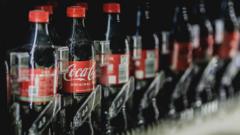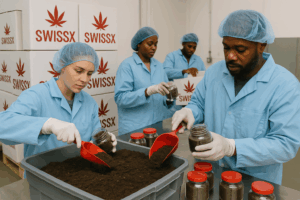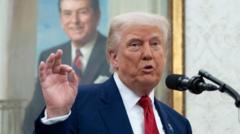Recent statements by Coca-Cola's lead executive highlight the company's shifting strategies in response to economic pressures and ongoing environmental concerns.
Coca-Cola May Shift to Plastic Bottles Amidst Trump Administration Tariffs

Coca-Cola May Shift to Plastic Bottles Amidst Trump Administration Tariffs
Coca-Cola's CEO warns of potential increases in plastic use if aluminium prices rise due to tariffs imposed by the Trump administration.
Coca-Cola, the beverage behemoth known for its extensive product offerings, faces a looming decision influenced by U.S. tariffs on imported metals. CEO James Quincey indicated during an investor call that if President Donald Trump's recently imposed 25% tariffs on all steel and aluminium lead to increased costs for aluminium cans, the company may have to pivot back to plastic packaging. This aligns with the beverage giant's historical pattern of utilizing plastic bottles over environmentally-friendly aluminium containers during times of economic strain.
In December, Coca-Cola already adjusted its sustainability goal, lowering its recycled material target from 50% by 2030 to 35-40% by 2035. Environmental advocates have consistently criticized Coca-Cola, labeling it as "the top global plastic polluter" for six consecutive years—an issue they assert could be exacerbated with increased reliance on plastic.
Quincey explained the company's approach, stating, “If one package suffers some increase in input costs, we continue to have other packaging offerings that will allow us to compete in the affordability space.” The insight raises concerns over the potential resurgence of plastic use, particularly at a time when recycling initiatives are gaining momentum.
Despite the growing popularity of aluminium containers in recent years due to their recyclability and alignment with sustainability efforts, the introduction of tariffs may put that trend at risk. The U.S. Geological Survey reports that nearly half of the aluminium consumed in the United States is imported, indicating that the tariffs could substantially elevate prices for consumers and companies alike.
Notably, the recent elimination of restrictions on plastic straws under the Trump administration further complicates the landscape of plastic waste reduction efforts. Many observers see this reversal—directly contradicting former President Biden's stance against plastic pollution—as a sign that environmental priorities may take a backseat to economic considerations.
As Coca-Cola navigates these challenges, the implications for environmental activism and sustainable packaging practices remain unclear. The beverage industry, in particular, must balance the increasing demand for sustainable options with the reality of fluctuating material costs.






















